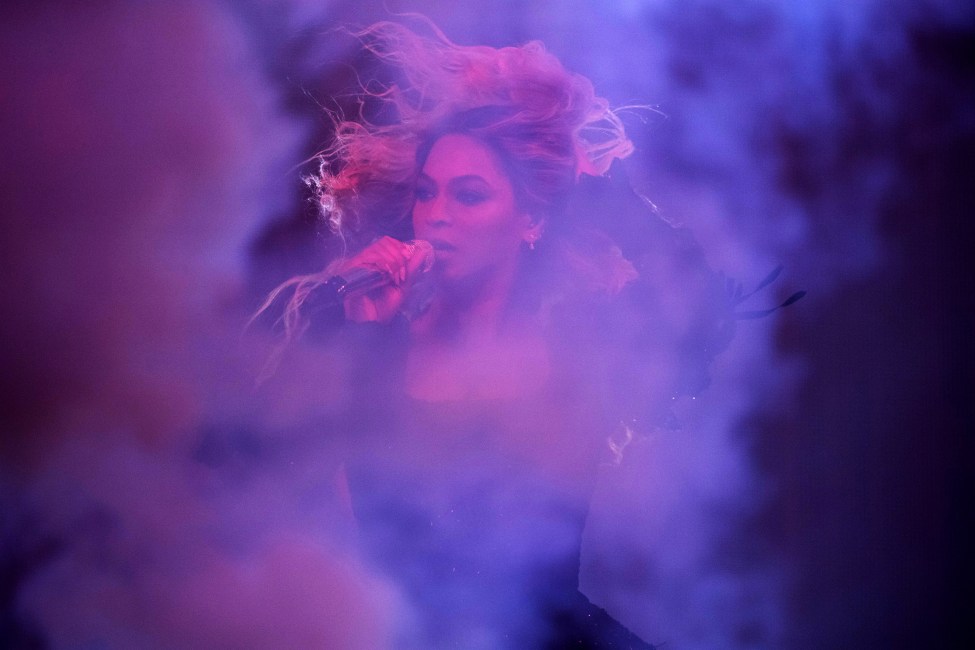Her creative opus turned the pop star into a political force
BY MELISSA HARRIS-PERRY
Having problems is the human condition. But there is a particular complication that comes with being black in America. “Between me and the other world there is ever an unasked question,” W.E.B. Du Bois wrote in his classic The Souls of Black Folk. “How does it feel to be a problem?” In 2016, Beyoncé, a pop star, chose to be a problem.
This could not have been a light decision. An artist who rose to fame in the late 1990s as lead singer of the teen girl group Destiny’s Child, she has since rocketed to the sort of first-name-only global superstardom that theoretically relieves her of the heaviest burdens of being a problem. Her brand seemed carefully crafted to speak to girl power more than to black power. Four years ago, sociologist Ellis Cashmore identified Beyoncé as “beyond black,” describing her flamboyant individualism as a commodity sold to Middle America as evidence the nation’s racial dilemma had ended. So much for that.
With Lemonade—an album, an Emmy-nominated film and, as America looked on, an experience—Beyoncé publicly embraced explicitly feminist blackness at a politically risky moment. For three years, the stream of cell-phone videos of fatal encounters between African Americans and local police sustained a national controversy that, in some quarters, came down to a choice between one and the other. She chose blackness even as many Americans rejected it, taking sides and never wavering.
From the moment its first single, “Formation,” dropped in February, Lemonade was a phenomenon. Rolling Stone described it as “her most powerful, ambitious statement yet” and later named it best album of the year. A spate of other music awards followed, along with nominations in the upcoming Grammys, including Album of the Year. And this being 2016, when pop superstars make their fortunes less from digital downloads than by selling tickets, Lemonade provided raw material for a breathtaking, $256 million–grossing world tour in which the choreography featured a cadre of natural-haired black women led by Beyoncé, barefoot, in ankle-deep water performing a fierce kinetic dance as she proclaimed, “Freedom! Freedom! Where are you? ‘Cause I need freedom too! I break chains all by myself.” Typical arena fare it was not.
Beyoncé had found a distinct voice, many iterations evolved from her childhood competitions on Star Search. But that alone doesn’t account for the reception to Lemonade: the headlines it generated, the memes it launched, the countless nerves it hit. Rather, it was the strategic, deliberate way Beyoncé deployed her artistry to elicit, reveal and invert dynamics of power, race and gender just when those very elements carried their greatest charge. And in so doing, she offered a recipe for transforming the bitter politics of 2016 into the sort of lemonade Southern black women have been making for generations.
Embracing Blackness
Beyoncé released “Formation” on the eve of the Super Bowl and at the outset of Black History Month. Scheduled to perform the game’s halftime show, she used what may be America’s biggest unofficial holiday to affirm her preference for kinky hair and big noses, evoke Hurricane Katrina, signify the Ferguson protests and mark a history of African-American organizing. In the stunning music video, she lies atop a New Orleans police car as it slowly sinks beneath rising waters that threaten to drown the city. Later, the camera is trained on a black boy in a hoodie, dancing defiantly before a row of armed police officers. He finishes with his arms outstretched, facing the officers, who throw their hands up. With that, Beyoncé threaded the needle between the joyful movement of a single black body and a political movement of black bodies. This became the origin point for her vernacular “slaying,” a double entendre of “killing it” and literal death. Black Lives Matter instantly gained its most visible ambassador.
She chose blackness even as many Americans rejected it, taking sides and never wavering
At the video’s close, Beyoncé returns to a wide-brimmed hat she wore earlier to defiantly raise both middle fingers. Now she mouths the lyrics, “You know you that bitch when you cause all this conversation.” She is fully aware of what she has done.
The backlash began the next day, when she and her dancers performed at the Super Bowl in outfits that paid homage to the Black Panthers. Former New York City mayor Rudy Giuliani called the show “outrageous” and “ridiculous.” Law enforcement criticized what they said was Beyoncé’s anticop message, and police unions around the nation encouraged members not to work security at her upcoming tour.
Beyoncé took the criticism head on, telling Elle, “I have so much admiration and respect for officers and the families of officers who sacrifice themselves to keep us safe. But let’s be clear: I am against police brutality and injustice.” In short order, Beyoncé had appropriated her own controversy, selling BOYCOTT BEYONCÉ T-shirts at her concerts.

To cynics, Beyoncé’s evolution was little more than a marketing move, a 34-year-old established act trying to appear edgy and interesting to younger consumers. But the months ahead provided painful validation. A hideous July brought the deaths of two black men at the hands of police that were caught on tape, prompting public outcry and the assassination of five Dallas police officers in revenge. By the month’s end, Beyoncé’s full-throated embrace of blackness was not going to be mistaken for trend setting.
More than six months after Beyoncé closed one NFL season with a radical political statement, Colin Kaepernick opened another with one of his own. When the San Francisco 49ers quarterback dropped to his knee during the national anthem to protest the fatal police shootings of black men and racial injustice more broadly, it touched off a movement that spread from pro stadiums to grade-school sidelines and prompted the President and a Supreme Court Justice to weigh in. Months later, in November, Beyoncé courted controversy of a different sort when she performed her single “Daddy Lessons,” about a woman whose father teaches her armed self-defense, alongside the Dixie Chicks at the Country Music Awards. The appearance caused an epic social-media backlash. Two days later she donned a polka-dot pantsuit to headline a campaign rally for Hillary Clinton.
It became unmistakable that the command for women to get in formation was not Beyoncé calling out steps to dancers in a club (as she does in her 2006 hit “Get Me Bodied”) so much as issuing a call to arms. Women, she warns, are about to find themselves at the center of a larger social and political clash, and will need to display calculated poise to rise above those who seek to drag them down. “Always stay gracious, best revenge is your paper”—your money, your success—Beyoncé cautions. For her fellow Clinton supporters, those words took on additional layers of meaning after Clinton was defeated by a man with infinitely less political experience who muttered “nasty woman” to her face. Beyoncé’s call for women to stay prepared, to rise above the fray and to remember that they will ultimately triumph may prove her most prescient lesson yet.
The Politics of the Personal
The complete Lemonade album hit in April, building on the foundation of “Formation” with paradigm-shifting visuals and richly textured representations of black womanhood. Its arc is a story of infidelity: a man has cheated on a woman who has loved him better than he did her, sacrificed her heart only to learn he was not worthy. Through mourning, anger and eventually empowerment, she learns to love herself and demand equity.
At the first encounter, this is a personal story.
In May 2014, surveillance footage caught an aggressive altercation between Beyoncé’s husband Jay Z and her sister Solange inside an elevator at the Standard Hotel in New York City. The clip has no audio but clearly shows an angry Solange making repeated attempts to hit and kick her brother-in-law. Beyoncé remains calm throughout the incident, moving to stand rigid between her family members while private security defuses the situation. In this tabloid light, Lemonade would explain Solange’s motives. Even while showing the reconciliation of her marriage, it offers an explanation and justification for rage.
Spend more time, and Lemonade is a political allegory.
Some have drawn a parallel between the album’s themes of infidelity, public humiliation, reconciliation and womanly strength and the Clinton marriage. And when the President-elect revived President Bill Clinton’s infidelity to deflect accusations of sexual assault against him during the campaign, the idea became painfully salient. But Lemonade is a specifically black feminist political story.

Black women have spent much of American history laboring at the margins to ensure the future of black families and communities. The work of black women in social and political organizing has often been thankless, unacknowledged. “What a wicked way to treat the girl that loves you,” Beyoncé sings in “Hold Up,” aptly describing how America has treated black women whose labor helped build the nation. “When you hurt me, you hurt yourself,” she roars in “Don’t Hurt Yourself,” speaking to the interconnectedness of citizens in a democracy. “Daddy Lessons” reminds black women of their Second Amendment rights. “Freedom” declares black women’s ability to carve out spaces of liberation for themselves even in the most constrained and oppressive circumstances.
Nowhere is this more visible than when Beyoncé allows us to see Sybrina Fulton, Lezley McSpadden and Gwen Carr, who, along with other women, came to be known as the Mothers of the Movement. These are the parents whose slain children—Trayvon Martin, Michael Brown, Eric Garner—have become touchstones of Black Lives Matter. When they appear in the video’s “Redemption” section, it leaves no doubt that the song is their anthem of painful, ongoing, endless struggle.
This is the lesson captured by Hattie White, Beyoncé’s grandmother-in-law. In a snippet of home video from her 90th birthday incorporated into “Freedom,” White gives the album its dynamic motif: “I had my ups and downs, but I always find the inner strength to pull myself up. I was served lemons, but I made lemonade.”
Du Bois asserted that to be black is to be a problem. Feminist activists have long insisted the personal is political. For Lemonade, Beyoncé used personal resilience and political resistance to transform the sour into something sustaining.
Harris-Perry is the Maya Angelou Presidential Chair at Wake Forest University and the editor at large for ELLE.com

